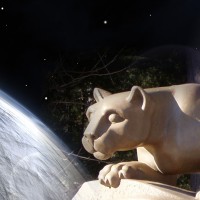Early Career Scientists Gather at Penn State for Symposium on Exoplanet Science

The Penn State Center for Exoplanets and Habitable Worlds is bringing together early career scientists from around the country to share their work about distant planets around other stars. The first annual Emerging Researchers in Exoplanet Science (ERES) Symposium is a research and career development conference for advanced undergraduate, graduate, and post-doctoral researchers to present their work and develop networking and communication skills within a group of their peers. The ERES Symposium is taking place May 28th and May 29th at Penn State.
ERES provides an unprecedented opportunity for early career scientists to network exclusively with other researchers at the same career stage, practice their presentation skills in a supportive environment, and facilitate collaboration between different branches of exoplanet research. Originally conceived as a regional conference, ERES has grown to nearly twice the initial estimated size and will have participants from across the US, and even has some international representation. All of the science presentations, both oral and poster presentations, are by young researchers, and span a variety of topics related to extra-solar planets, including how the planets form, how we find them, and the prospects for finding life on distant worlds.
In addition to participant-led presentations, the symposium has brought together career development panels to advise participants on fellowship and grant writing, present the variety of career paths open to astronomy graduates, and discuss prevalent career issues such as imposter syndrome and work-life balance.
The organizing committee for ERES is led by graduate students and postdoctoral researchers from the Department of Astronomy and Astrophysics, the Center for Exoplanet and Habitable Worlds, and representatives from the two other partner universities, Cornell University and Yale University. The ERES symposium also is a unique chance for early career scientists to gain experience planning all aspects of a conference, as well as leading a group of their peers in a professional setting.
The study of exoplanets – planet around other stars—has been a prominent area of scientific research since the discovery of the first exoplanets by current Penn State astronomer, Dr. Alex Wolszczan in 1992. Since that time, astronomers have discovered a wide variety of exoplanets, many of which are unlike anything that exists in our own solar system. Early career scientists have been a part of these discoveries from the advent and continue to play an important role in the advancement of today’s era of discovery. For example, young scientists at Penn State are playing key roles in developing the Habitable Zone Planet Finder for the Hobby-Eberly Telescope and the MINERVA survey to search for low-mass planets in the habitable zones of nearby stars. The ERES Symposium will take place on Thursday May 28th and Friday May 29th at the Nittany Lion Inn. Dr. Wolszczan will be introducing Provost Dr. Nicholas Jones for his opening remarks on Thursday morning. Graduate students and post-docs from Penn State and its partner universities will chair participant-led research talk sessions, and career development panels feature invited speakers from nearby schools and companies to speak about their personal career experiences and achievements. Poster presentations and moderated lunchtime discussions will provide participants with a chance to network and discuss topics one-on-one.
The ERES Symposium is supported by Penn State’s Department of Astronomy & Astrophysics, the Penn State Center for Exoplanets and Habitable worlds, and the NASA Exoplanet Science Institute at the California Institute of Technology. In 2016 ERES will be hosted by Cornell University and Yale University in 2017.
To learn more, you can watch most oral presentations online, or read the live blog at http://eres-symposium.org or twitterstream @ERESsym.




